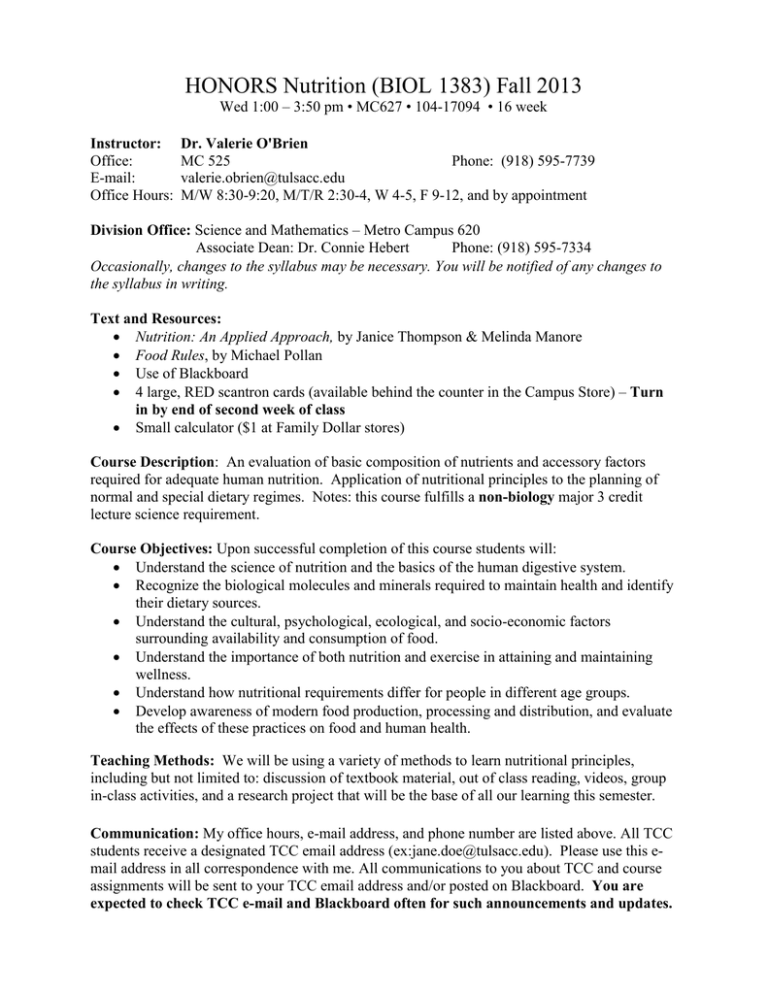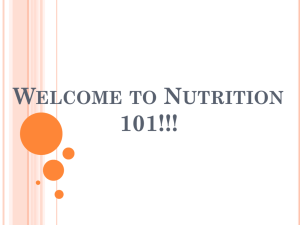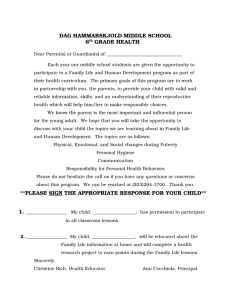General Entomology (ZOOL 3214) Fall 2003
advertisement

HONORS Nutrition (BIOL 1383) Fall 2013
Wed 1:00 – 3:50 pm • MC627 • 104-17094 • 16 week
Instructor:
Office:
E-mail:
Office Hours:
Dr. Valerie O'Brien
MC 525
Phone: (918) 595-7739
valerie.obrien@tulsacc.edu
M/W 8:30-9:20, M/T/R 2:30-4, W 4-5, F 9-12, and by appointment
Division Office: Science and Mathematics – Metro Campus 620
Associate Dean: Dr. Connie Hebert
Phone: (918) 595-7334
Occasionally, changes to the syllabus may be necessary. You will be notified of any changes to
the syllabus in writing.
Text and Resources:
Nutrition: An Applied Approach, by Janice Thompson & Melinda Manore
Food Rules, by Michael Pollan
Use of Blackboard
4 large, RED scantron cards (available behind the counter in the Campus Store) – Turn
in by end of second week of class
Small calculator ($1 at Family Dollar stores)
Course Description: An evaluation of basic composition of nutrients and accessory factors
required for adequate human nutrition. Application of nutritional principles to the planning of
normal and special dietary regimes. Notes: this course fulfills a non-biology major 3 credit
lecture science requirement.
Course Objectives: Upon successful completion of this course students will:
Understand the science of nutrition and the basics of the human digestive system.
Recognize the biological molecules and minerals required to maintain health and identify
their dietary sources.
Understand the cultural, psychological, ecological, and socio-economic factors
surrounding availability and consumption of food.
Understand the importance of both nutrition and exercise in attaining and maintaining
wellness.
Understand how nutritional requirements differ for people in different age groups.
Develop awareness of modern food production, processing and distribution, and evaluate
the effects of these practices on food and human health.
Teaching Methods: We will be using a variety of methods to learn nutritional principles,
including but not limited to: discussion of textbook material, out of class reading, videos, group
in-class activities, and a research project that will be the base of all our learning this semester.
Communication: My office hours, e-mail address, and phone number are listed above. All TCC
students receive a designated TCC email address (ex:jane.doe@tulsacc.edu). Please use this email address in all correspondence with me. All communications to you about TCC and course
assignments will be sent to your TCC email address and/or posted on Blackboard. You are
expected to check TCC e-mail and Blackboard often for such announcements and updates.
STUDENT PERFORMANCE EXPECTATIONS
While I will do my best to communicate principles of nutrition in this course, you are ultimately
responsible for your own learning and achievement. The material in this course is cumulative, so
do not get behind in reading and assignments. If you are having trouble understanding
something, see me as soon as possible. I cannot help if I do not know you are having a problem.
I will be discussing current events and publications in nutrition throughout the course. Although
the textbook is vital to your success, you will be responsible for information that is conveyed in
lecture, class activities, videos, and assignments when exam time comes.
Attendance: Attendance is essential for successful completion of the course, and class
participation counts for ~10% of your total grade. Attendance will be taken during each class
period and unannounced quizzes and assignments given based on a class activity cannot be made
up except in extreme circumstances. In the case of an unavoidable absence, it is the student’s
responsibility to obtain assignments and/or lecture notes (please contact classmates and check
Blackboard before e-mailing me). Please let me know if you will be absent, as many of our
activities are dependent on one another.
Classroom Etiquette: Open and mutually respectful communication of varied opinions, beliefs,
and perspectives during classroom discussion encourages the free exchange of ideas that is
essential to higher learning and to the ability to learn from each other. You are encouraged to
ask questions and share your thoughts during class in a way that is productive and beneficial.
NO cell phones, iPods, or any other awesome gadget you may possess should be
used during class! Your text messages can wait. Don’t check them in class- it’s rude!
You will be asked to leave the classroom if your cell phone makes an appearance and
you will receive no credit for quizzes or in-class activities (including exams) that day.
The classroom will be a positive, respectful learning environment. Any behavior
from a student that disrupts that environment will not be tolerated. This includes
arriving late/leaving early, holding private conversations and sleeping during class
time. If you prefer to chat or nap, please do not bother coming to this class as you may
be asked to leave and/or not receive in-class points.
Special note: On exam days, students who are not in class by the time I have finished
handing out and explaining the exam will not be admitted to class. Arriving late for an
exam is disruptive. Please make arrangements to ensure you are on time on exam day.
Email: You should always include your class day and time in the subject line (e.g., MW830).
Your name should appear in the body of the e-mail and it should be sent from your TCC address.
Student Evaluation
Dr. O’Brien reserves the right to change, add to, delete, or alter the evaluation techniques
and/or values at anytime during this course. Students will be notified of any changes.
Assignments: Assignments are due on the day specified at the beginning of class. Points will
be deducted from late assignments as follows:
1-minute -24 hours late will result in a 5% reduction of the assignment grade
24 - 48 hours late will result in a 10% reduction of the assignment grade
Assignments will not be accepted if more than 48 hours late.
Examples of assignments and points possible that will be given in this course include:
In-class activities/participation/quizzes: (~50 points).
What am I Eating?: (10 points). Students will familiarize themselves with their own
dietary habits. Further guidelines will be provided.
Diet Analysis: (50 points). Part 1: Students will keep a 5-day food record and generate
reports via a diet analysis website. Part 2: Students will evaluate their diet for proper
nutrition and recommend changes based on their diet reports.
“My Food Culture” oral history and food sharing: (100 points). Details to be
provided.
Class Research project: (200 points). We will design and conduct a semester long class
project. Most of the work for the project will take place during class periods. Several
field trips may be involved. The project will culminate in a service-learning presentation.
Extra Credit: Extra credit will exist in the form of bonus questions on exams and
possibly one or two assignments and should not be expected to equal more than 20 points
for the semester.
Exams: There will be 3 class exams. Each class test will be worth 100 points. Tests should be
taken when scheduled.
Test content will include all assigned materials covered in the course whether from the lecture,
in-class activities, assignments or the text. Corrections on test grading must be made within one
week of in-class test return date.
GRADING SCALE: Total Points Possible = ~ 900 points
A = 810-900 points
B = 720-809 points
C = 630-719 points
D = 540-629 points
F = below 540 points
OTHER IMPORTANT STUFF
Course Withdrawal: Check the TCC Academic Calendar for the deadline to withdraw that applies to
the course(s) you are enrolled in. Contact the Advisement Office at any TCC campus to initiate
withdrawal from a course ('W' grade) or to change from Credit to Audit. Students who stop participating
in the course for greater than two weeks and fail to withdraw will be Administratively withdrawn (AW) by
the instructor, or receive a final course grade of “F.”
Inclement Weather: TCC rarely closes. If extreme weather conditions or emergency situations arise,
TCC always gives cancellation notices to radio and television stations. This information is also posted on
the TCC website (www.tulsacc.edu).
Disability Resources: It is the policy and practice of Tulsa Community College to create inclusive
learning environments. Accommodations for qualifying students in compliance with the Americans with
Disabilities Act (ADA) and Section 504 of the Rehabilitation Act are available. To request
accommodations, contact the Education Access Center (EAC) at eac@tulsacc.edu or call (918) 595-7115
(Voice). Deaf and hard of hearing students may text (918) 809-1864.
Academic Dishonesty: Academic dishonesty or misconduct is not condoned or tolerated at campuses
within the Tulsa Community College system. In the case of academic dishonesty a faculty member may:
1) require the student to redo an assignment or test, or require the student to complete a substitute
assignment or test; 2) record a "zero" for the assignment or test in question; or 3) recommend to the
student that the student withdraw from the class, or administratively withdraw the student from the class.
Plagiarism of published material, internet findings, and COPYING directly from other students
are all forms of cheating! Assignments are to be in your own words... ALWAYS!
TENTATIVE! HONORS NUTRITION COURSE SCHEDULE – Fall 2013
This schedule is based on a non-Honors class platform, and as such is very tentative at first.
Changes to this schedule will certainly be necessary. Changes will be announced in class.
Week
Aug 19-23
Aug 26-30
Sept 2-6
Topic
Chapter
Syllabus
Role of Nutrition in our Health
Assignment: What am I eating?
1
Designing a Healthful Diet - Labels
2
What am I Eating assignment completed/due
Discussion: What are you Eating?
Designing a Healthful Diet – MyPlate & food math
Reading: InDepth: Alcohol
2
1
InDepth: Alcohol Quiz
Are We Really What We Eat?
3
Discuss project
EXAM 1
1-3
Sept 9-13
American Eaters
American Eaters - discussion
Sept 16-20
Sept 23-27
Sept 30Oct 4
Oct 7-11
Oct 14-18
Carbohydrates
4
Carbohydrates
4
Fats
5 and assigned
Assignment: Diet Analysis (Library session)
Project internet research
Proteins
Proteins
6
6
Fluid and Electrolyte Balance
7
Diet Analysis Assignment Due
EXAM 2
Assignment: My Food Culture: an oral history
Antioxidants, Bone Health, and Energy Metabolism
4-7
Ch. 8-10
Topic
Week
Oct 21-25
Go over Exam 2
Metabolic Syndrome, Diabetes, Cardiovascular
Disease, and Cancer
Reading: Obesity, Type II Diabetes, and
Fructose
Class Activity: Obesity, Type II Diabetes, and
Fructose
Maintaining a Healthy Weight
Videos: Skinny on Obesity
Oct 28Nov 1
Nov 4-8
Chapter
InDepth Sections
BB
11
Online
Skinny on Obesity Quiz
Discussion
My Food Culture Assignment Due
Nutrition and Physical Activity
12
Project team work
Nov 11-15
Nov 18-22
Project Field Trip
EXAM 3
Work on Project
Nov 25-29
Topics in Nutrition
THANKSGIVING BREAK – No classes
Topics in Nutrition
Dec 2-6
Topics in Nutrition Exam
Dec 9-13
Project Culmination/Presentation
8-12 and assigned



